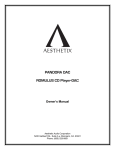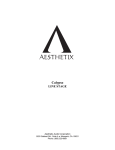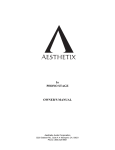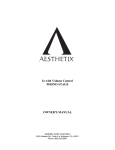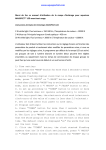Download Aesthetix Atlas Owner`s manual
Transcript
A T L A S Hybrid Power Amplifier Owner’s Manual For both Stereo and Mono Amplifiers PLEASE READ THIS DOCUMENT IN ITS ENTIRETY BEFORE USING THE ATLAS. Aesthetix Audio Corporation 5220 Gabbert Rd., Suite A ♦ Moorpark, CA. 93021 Phone: (805) 529-9901 The lightning flash with arrowhead symbol, within an equilateral triangle, is intended to alert the user to the presence of uninsulated “dangerous voltage” within the product’s enclosure that may be of significant magnitude to constitute a risk of electric shock to persons. The exclamation point within an equilateral triangle is intended to alert the user to the presence of important operating and maintenance (servicing) instructions in the literature accompanying the product. WARNING TO REDUCE THE RISK OF FIRE OR ELECTRIC SHOCK, DO NOT EXPOSE THIS PRODUCT TO RAIN OR MOISTURE CAUTION: TO PREVENT ELECTRIC SHOCK, DO NOT USE THE AC (POLARIZED) PLUG WITH AN EXTENSION CORD, RECEPTACLE OR OTHER OUTLET UNLESS THE BLADES CAN BE FULLY INSERTED TO PREVENT BLADE EXPOSURE. Extension cords are not recommended for use with this product. 2 PREFACE INTRODUCTION Thank you for purchasing the Atlas power amplifier. It has been engineered to deliver the highest attainable sound quality from your music sources. This is its sole purpose. Only the highest grade electronic components are used in the Atlas, including: non-inductive Roederstein metal film resistors in the signal path; polystyrene, polypropylene, and electrolytic power supply, bypass, and signal capacitors; low noise matched vacuum tubes; glass epoxy dual mono circuit boards; 16 gauge aluminum chassis; custom wound low flux power transformers. PLACEMENT The Atlas main unit should be located away from possible sources of hum such as power cords, power transformers and the like. It should not be located near any other heat source such as another power amplifier or power supply. It must be kept well ventilated any time it is on. If it is positioned within an enclosed space then fans may be warranted. All air vents must remain unobstructed. BURN IN TIME This unit has a break in period of about 1 month during which continuous improvement in sound quality will be observed. IMPORTANT Save all packaging in a dry place away from fire hazards. Your Atlas is a precision electronic instrument and should be properly packaged any time shipment is made. In the unlikely event that you have to return your Atlas to the factory for service, or if you send it to us for updating, the original packaging will best protect the unit from shipping damage. In order to achieve the fullest flexibility and enjoyment from your Atlas, we at Aesthetix recommend that you read this manual in full before connecting the unit to your audio system. Note: It is imperative that the Atlas be operated in a well ventilated environment and the immediate external temperature be maintained as specified. External cooling fans may be required in some cases. Do not stack any equipment directly above or below the Atlas to protect it from overheating, as well as the continued functionality of any equipment near and around it. Warning: Each channel is a balanced bridge amplifier, thus the negative speaker terminal is NOT a ground, and cannot be connected to a system ground or a loudspeaker system with a common ground. Consult your speaker manufacturer to ensure that any speaker in your system that will be connected to the Atlas does NOT have internal circuitry with a common ground. WARNING United States law prohibits disposition of these commodities to Libya, Laos, North Korea, Cambodia or Cuba unless otherwise authorized by the United States. AFTER MARKET and THIRD PARTY MODIFICATIONS Please note that any after market and/or third party modifications will void the warranty. In the case of changing the feet on a unit, in order to prevent any damage (which will also not be covered under warranty), please verify that the screws being used to secure non-Aesthetix feet do not screw any deeper into the chassis than the original ones. The original screw is 10-32 by 3/8” and extends into the chassis 1/8 inch. Manual Conventions All information contained in this document applies for both the Stereo and Mono Atlas models, unless otherwise specified. For clarity purposes, references to buttons, LEDs and menu data will be shown in bold capital letters. © 2007 Aesthetix Audio Corporation. All rights reserved. Written and Illustrated by Glenn Buckley No part of this publication may be reproduced or transmitted in any form or by any means, electronic or mechanical, for any purpose, without the express written permission of Aesthetix Audio Corporation. 3 SAFETY PRECAUTIONS Please carefully read each item of the operating instructions and safety precautions before installing and using this product. Use extra care to follow the warnings written on the product itself and/or in the operating instructions. Keep the operating instructions and safety precautions for future reference. CAUTION: TO REDUCE THE RISK OF ELECTRICAL SHOCK, DO NOT REMOVE ANY OF THE COVER PANELS. NO USER-SERVICEABLE PARTS INSIDE. PERSONNEL ONLY. REFER ALL SERVICING TO QUALIFIED SERVICE TO PREVENT FIRE OR SHOCK HAZARD, DO NOT ALLOW LIQUIDS TO SPILL OR OBJECTS TO FALL INTO ANY OPENINGS OF THE PRODUCT. THIS UNIT IS SUPPLIED WITH A 3 PIN GROUNDED AC PLUG. ALWAYS INSERT THE AC PLUG INTO A GROUNDED OUTLET. DO NOT REMOVE THE GROUND PIN OR DISABLE THE GROUND FOR ANY PURPOSE. BEFORE MAKING ANY CONNECTIONS TO THE ATLAS, FIRST TURN OFF THE POWER AND THEN DISCONNECT THE AC POWER CORD. WHEN INSTALLING THE ATLAS IN YOUR SYSTEM, MAKE CERTAIN TO ALLOW A MINIMUM OF 4 INCHES OF VENTILATION ON EACH SIDE OF THE UNIT. ALSO ALLOW AT LEAST 6 INCHES OF VENTILATION SPACE ABOVE THE UNIT. IMPROPER VENTILATION OF THE UNIT MAY CAUSE OVERHEATING, WHICH MAY DAMAGE THE UNIT AND CAUSE A FIRE. PLACE THE UNIT ON A SOLID SURFACE ONLY. I.E. NOT ON CARPET, ETC. DO NOT PLACE THE ATLAS NEAR HEAT SOURCES SUCH AS DIRECT SUNLIGHT, STOVES, HEAT REGISTERS, RADIATORS OR OTHER HEAT PRODUCING EQUIPMENT. TO PREVENT DAMAGE TO THE ANALOG OUTPUT CIRCUITRY, BE CERTAIN NOT TO SHORT THE OUTPUT SIGNAL TO GROUND. ENSURE THAT YOUR AUDIO OUTPUT CABLES DO NOT HAVE ANY INTERNAL SHORTS BEFORE CONNECTING THEM TO THE ATLAS. IF REPLACEMENT OF THE AC LINE FUSE AND/OR ANY INTERNAL FUSE BECOMES NECESSARY, REPLACE ONLY WITH SAME VALUE AND TYPE OF FUSE. NEVER BYPASS THE FUSE. IF THE AC CORD BECOMES DAMAGED, DO NOT USE IT. IMMEDIATELY REPLACE IT WITH A NEW ONE OF THE SAME OR BETTER RATING. IT IS IMPERATIVE THAT THE ATLAS BE OPERATED IN A WELL VENTILATED ENVIRONMENT AND THE IMMEDIATE EXTERNAL TEMPERATURE BE MAINTAINED AS SPECIFIED. EXTERNAL COOLING FANS MAY BE REQUIRED IN SOME CASES. DO NOT STACK ANY EQUIPMENT DIRECTLY ABOVE OR BELOW THE ATLAS AS TO PROTECT IT FROM OVERHEATING, AS WELL AS THE CONTINUED FUNCTIONALITY OF ANY EQUIPMENT NEAR AND AROUND IT. EACH CHANNEL IS A BALANCED BRIDGE AMPLIFIER, THUS THE NEGATIVE SPEAKER TERMINAL IS NOT A GROUND, AND CANNOT BE CONNECTED TO A SYSTEM GROUND OR LOUDSPEAKER SYSTEM WITH A COMMON GROUND. CONSULT YOUR SPEAKER MANUFACTURER TO ENSURE THAT ANY SPEAKER IN YOUR SYSTEM THAT WILL BE CONNECTED TO THE ATLAS DOES NOT HAVE INTERNAL CIRCUITRY WITH A COMMON GROUND. IF THE TOP COVER HAS TO BE REMOVED, FIRST TURN OFF THE REAR PANEL POWER SWITCH AND WAIT 15 MINUTES. THEN REMOVE THE TWO 6-32 PANHEAD SCREWS AT THE TOP OF THE REAR PANEL AND LIFT THE BACK OF THE TOP COVER UPWARDS. 4 Table Of Contents PREFACE............................................................................................................................3 INTRODUCTION ..............................................................................................................3 PLACEMENT....................................................................................................................3 BURN IN TIME .................................................................................................................3 IMPORTANT ....................................................................................................................3 WARNING ........................................................................................................................3 SAFETY PRECAUTIONS ...................................................................................................4 Table Of Contents ...............................................................................................................5 Front Panel Layout ..............................................................................................................6 Rear Panel Layout...............................................................................................................7 CONNECTIONS ...............................................................................................................9 OPERATION .......................................................................................................................9 STANDBY.........................................................................................................................9 SELECTING INPUTS .....................................................................................................10 CROSSOVER.................................................................................................................10 MUTE .............................................................................................................................10 REMOTE TRIGGER .......................................................................................................10 RS232.............................................................................................................................11 Appendix A Troubleshooting Guide .................................................................................12 Display Codes ................................................................................................................12 Appendix B Wiring Diagrams ...........................................................................................13 Appendix C Block Diagram ..............................................................................................15 Appendix D RS232 Protocol.............................................................................................16 Appendix E Specifications ..............................................................................................17 5 Front Panel Layout Figure 1 - Front Panel Layout – Stereo and Mono versions 1. DISPLAY button. Press to extinguish or turn on the display, set display brightness. 2. Display LED. Not used. 3. LED DISPLAY 4. MUTE button. Toggle to mute or unmute the Altas. 5. Mute LED. Illuminates when the Mute function is active. 6. Pressing the left side of the DISPLAY will decrement the value when in a submenu. 7. INPUT button. Used to select the appropriate rear panel input connector. Ensure that this is set correctly. 8. INPUT LED. Illuminates when the INPUT menu is active. 9. STANDBY button. After the rear panel MAIN POWER switch is turned on press the front panel STANDBY button to exit the standby mode. Pressing this button again will put the Atlas into STANDBY and illuminate the Standby LED. 10. Standby LED. Illuminates Red when the Atlas is in Standby, Blue when the Atlas is active (out of standby). 11. FREQUENCY button. Press to enter the crossover frequency selection menu. 12. Frequency LED. Illuminates when the Frequency menu is active. 13. Pressing the right side of the DISPLAY will increment the value when in a submenu. 6 Rear Panel Layout Figure 2 - Rear Panel Layout – Stereo Version 1. 6-32 screws to secure the top cover. Before removing top cover, turn off rear panel MAIN POWER switch and wait 15 minutes. Then remove the two 6-32 screws and pull up top cover from the rear panel. 2. Right channel BINDING POST. appropriately marked terminals. Connect plus and minus speaker wires for the right speaker to 3. AC POWER INPUT. 4. MAIN POWER Switch. Disconnects AC to all circuits. It is recommended that this be left ON at all times during regular use with the exception of whenever cables are connected/disconnected or when the unit is not going to be used for an extended period of time. 5. DB9 RS232 connector. Used for connecting a system control device to the Atlas to control and monitor its functions. 6. Remote TRIGGER jack. When the rear panel TRIGGER jack receives a 5-12 VDC pulse the Atlas will change its mode from either standby to operate, or operate to standby, depending on its current mode. 7. Left channel BINDING POST. Connect plus and minus speaker wires for the left speaker to appropriately marked terminals. 8. Right channel Direct Input SINGLE ENDED input jack. 9. Right channel Crossover Input SINGLE-ENDED input jack. 10. Right channel Crossover Input BALANCED input jack. 11. Right channel Direct Input BALANCED input jack. 12. Chassis FUSE. Replace with same type and rating only. (Spare fuse inside). 7 Figure 3 - Rear Panel Layout – Mono Version Note: Figure 3 shows a Right Channel Mono Atlas. A Left Channel Mono Atlas would be identical with the exception of the inputs and the output being on the opposite side. 1. 6-32 screws to secure the top cover. Before removing top cover, turn off rear panel MAIN POWER switch and wait 15 minutes. Then remove the two 6-32 screws and pull up top cover from the rear panel. 2. Output channel BINDING POST. Connect plus and minus speaker wires for the appropriate speaker to the appropriately marked terminals. 3. AC POWER INPUT. 4. MAIN POWER Switch. Disconnects AC to all circuits. It is recommended that this be left ON at all times during regular use with the exception of whenever cables are connected/disconnected or when the unit is not going to be used for an extended period of time. 5. DB9 RS232 connector. Used for connecting a system control device to the Atlas to control and monitor its functions. 6. Remote TRIGGER jack. When the rear panel TRIGGER jack receives a 5-12 VDC pulse the Atlas will change its mode from either standby to operate, or operate to standby, depending on its current mode. 7. Direct Input SINGLE ENDED input jack. 8. Crossover Input SINGLE-ENDED input jack. 9. Crossover Input BALANCED input jack. 10. Direct Input BALANCED input jack. 11. Chassis FUSE. Replace with same type and rating only. (Spare fuse inside). 8 CONNECTIONS CAUTION: Make all input and output connections before turning on the Altas Main Power Switch. Determine whether the internal crossover is to be used. If it is, use either the single-ended or balanced CROSSOVER INPUT jacks. If the internal crossover will not be used, use either of the DIRECT INPUT jacks. CAUTION! Note that when connecting the speaker cables that the positive terminal is at the bottom of the left channel whereas the positive terminal is at the top of the right channel. Follow the markings on the metal plate and the side of the Binding Posts. There is a red circle above or below the binding post, which indicates the positive terminal. WARNING! The Atlas rear panel Main Power switch should always be turned OFF when making or changing speaker connections. Mute the Atlas when selecting Inputs and when connecting/disconnecting INPUT cables. Ensure that the INPUT setting is correct in that it is set to the input jack being used. Only one preamp may be connected to the Atlas; the input switch does not allow more than one. OPERATION Refer to the Rear Panel Layout diagrams (figure 2 and 3) before proceeding with operation. Once all connections have been made, turn on the rear panel Main Power switch. The Standby LED will be red. CAUTION! To avoid loud pops and possible speaker damage, Turn on all other system components before taking the Atlas out of standby. STANDBY Press the STANDBY button once. The Standby LED will blink for approximately 30 seconds, then it will turn blue, which indicates that the Atlas is active. At this point the Mute LED will be off. When the Atlas is fully active (out of standby), the DISPLAY will be blank (no segments turned on). Pressing the STANDBY button when the Standby LED is currently blue will put the Atlas into Standby, at which time the Standby LED will turn red. The STANDBY button will not respond if the FREQUENCY or INPUT menus are active. Note: Put the Atlas into Standby before turning off the rear panel AC Power Switch. It is normal that a slight pop may be heard when going into or coming out of Standby. This is due to the amplifier switching from high bias to low bias. Important Note: In order to extend the life of the tubes, do not have a source playing into the Atlas while it is in STANDBY. Mute the Preamp first. 9 SELECTING INPUTS Make sure that the Atlas is muted and then select the desired input jacks by pressing the INPUT button. The currently selected jack will be shown in the display. The possible options are SE 1, BAL 1 (these are the DIRECT INPUTs, and SE 2 and BAL 2. The latter two (the ones with the number 2 after them) correspond to the CROSSOVER INPUTs. To change a setting, press either the left (down) or right (up) edge of the DISPLAY lens. Warning: It is imperative that the input be set correctly. An incorrect setting will result in compromised performance. Press the INPUT button to exit the Input menu. The Input LED will extinguish. Press the MUTE button to unmute the Atlas. CROSSOVER The Atlas has a built in Hi Pass crossover with a slope of 6dB/octave. If the crossover is to be used, first connect either a single-ended or balanced cable to the rear panel CROSSOVER INPUT, press the MUTE button and then press the FREQUENCY button. The Frequency LED will illuminate and the current Frequency setting will show in the DISPLAY. The factory setting is OFF. The possible values, in Hertz (Hz) are: 40, 50, 60, 70, 80, 90, 100, 110, 125, 135, 145, 155, 170, 180, 190 and 200. Select the desired setting, which will affect both channels, by pressing either the left (down) or right (up) edge of the DISPLAY lens. Press the FREQUENCY button to exit the Frequency menu. The Frequency LED will extinguish. If it is desired to not use the crossover, connect either Single-Ended or Balanced cables to the Direct Input connectors. MUTE Toggle the Mute button to Mute or Un-mute the Atlas. When it is muted, the Mute LED will be lit. Important Note: In order to extend the life of the tubes, do not mute the Atlas while music is playing. Mute the Preamp first. REMOTE TRIGGER The remote trigger control allows an external component to control the STANDBY state of the Atlas. Connect the Trigger Out jack from a host component to the Remote Trigger jack on the rear panel of the Atlas. The trigger voltage should be between +5 and +12 volts DC. There are two signal types that may be used; level and pulse. The Atlas automatically senses which type of trigger signal it is receiving and responds accordingly. A positive pulse that is greater than 100mS is interpreted as a Level trigger whereas shorter pulses are treated as Pulse triggers. The minimum detectable pulse is 50uS. When a Level type signal is received, the Atlas will be taken out of standby and when that signal drops to zero, the Atlas will go into standby. When a positive pulse signal is received the Atlas will toggle between STANDBY and OPERATE modes, duplicating the action of the front panel STANDBY button. Use a 1/8” (3.5mm) mono plug for this jack. The tip is positive and the sleeve is ground. 10 RS232 All functions of the Atlas can be controlled and monitored via RS232, using the DB9 connector. As long as the rear panel power switch in turned on, the RS232 circuitry is always active, thus allowing the Atlas to be taken out of STANDBY via RS232. Refer to Appendix C for more information on using RS232. Please refer to Appendix D for additional information. 11 Appendix A Troubleshooting Guide If the Atlas should function abnormally during operation, please review the items in the following checklist. Please be sure to thoroughly check all other connected components such as speakers, preamplifiers, as well as cables. Symptom Possible Cause(s) Remedy No power or front panel lights and no sound. Power cable is not inserted 100% into AC input connector. Power Supply fuse is open. Rear panel fuse is open. Circuit breaker is open (AC outlet). Ensure that the AC cord is inserted all the way into the Atlas and that the wall outlet is active. Replace with same type and rating ONLY Replace with same type and rating ONLY. Check the AC outlet circuit breaker and reset, if necessary, or contact your dealer. See “Display codes” section below. Verify that the Input jack that is physically being used is the same one that is shown on the display when the INPUT button is pressed.. Unmute the Atlas. The amp module(s) may be overheated. Shut down the Atlas until it cools. An external fan may be necessary. Replace with same type and rating ONLY. No audio output. Module rail fuse is open. Input Jack not correctly mapped. Mute is active Overheating Hot/Warm Amp module fuse is open. Normal operation Display Codes If the Atlas displays the following message in the display upon power up: LEFT FUSE PLUS LEFT FUSE NEG RITE FUSE PLUS RITE FUSE NEG The left channel plus fuse is blown. Replace with same type and value. The left channel minus fuse is blown. Replace with same type and value. The right channel plus fuse is blown. Replace with same type and value. The right channel minus fuse is blown. Replace with same type and value. HOT Heatsink Temperature over 85 C. Turn atlas off to cool it. Research reason for overheating. OC DC offset on the output. If one of these messages is in the display on porer up, the Atlas will not come out of STANDBY until the error is corrected. 12 Appendix B Wiring Diagrams Figure 4 - Examples of Typical Input and Output Connections – Atlas Stereo 13 Wiring Diagrams – Con’t Figure 5 - Examples of Typical Input and Output Connections – Atlas Mono Right Figure 5 - Examples of Typical Input and Output Connections – Atlas Mono Left 14 Appendix C Block Diagram Figure 4 - Block Diagram 15 Appendix D RS232 Protocol RS232 Hardware Connections Figure 5 – Atlas RS232 Jack Pinout These are the connector drawings only. The RS232 cable must be a regular RS232 or mouse extender cable, wired pin for pin. The RS 232 Protocol data is available upon request. 16 Appendix E Specifications Atlas Stereo Inputs: Connectors: 1 Single-ended and 1 Balanced per channel for the Direct Input. 1 Single-ended and 1 Balanced per channel for the Crossover Input. Input Impedance: Direct: Crossover: Outputs: 470 KΩ Single-ended or Balanced for each phase. Variable. Input sensitivity: (Balanced) 2.3V RMS typical input for 200W into 8 ohms. Gain: (Balanced) 24dB. Polarity: (Single-ended) Non-Inverting. (Balanced) Pin-2 = Positive, Pin-3 = Negative for Non-Inverting Output. Connectors: 1 balanced output per channel. Impedance: 0.25 ohms @ 1KHz Tubes (2) -One 6SN7 or equivalent per channel. I/O: RS232: 1 DB9 connector. Modes/Processes: Standby, High Pass Crossover. Power Output: (8 ohms) 200 W (rated) (4 ohms) 400 W (rated) 250 W (typical at 1% THD, one Channel, 210W both channels driven) 410 W (typical, one channel driven) Frequency Response:(-3dB points @ full power) 4 - 150 kHz. THD+Noise: <1.0% (both channels driven at 200W into 8 ohms). Power Consumption: 100W @ Standby,150W @ Idle Trigger Inputs: 1/8” Jack, operates on either 5-12 VDC Pulse < 100mS or 5-12V DC. Dimensions: 17 7/8” W x 7 1/2” H x 18" D (454 x 191 x 457 mm) Weight: 70 Lbs. Stand alone (32.67 Kg), 80 Lbs. Boxed with accessories (36.29 Kg) Maximum Operating Internal: Temperature: Room: Fuses: 176° F (80° C) 122° F (50° C) Mains: Power Supply: Audio Outs: 10A SB @ 100, 117VAC 2A SB @ 100, 117V AC 10A FB. Specifications subject to improvement or change without notice. 17 5A SB 230, 245VAC 1A SB 230, 245VAC Specifications Con’t Atlas Mono Inputs: Connectors: 1 Single-ended and 1 Balanced for the Direct Input. 1 Single-ended and 1 Balanced for the Crossover Input. Input Impedance: Direct: Crossover: Outputs: 470 KΩ Single-ended or Balanced for each phase. Variable. Input sensitivity: (Balanced) 3.1V RMS typical input for 300W into 8 ohms. Gain: (Balanced) 24dB. Polarity: (Single-ended) Non-Inverting. (Balanced) Pin-2 = Positive, Pin-3 = Negative for Non-Inverting Output. Connectors: 1 balanced output. Impedance: 0.25 ohms @ 1KHz Tube(s) One 6SN7 or equivalent per channel. I/O: RS232: 1 DB9 connector. Modes/Processes: Standby, High Pass Crossover. Power Output: (8 ohms) 300 W (rated) (4 ohms) 550 W (rated) Frequency Response:(-3dB points @ full power) 4 - 150 kHz. THD+Noise: <1.0% @ full power. Power Consumption: 75W in Standby, 140W @ idle, 700W @300W into 8 ohms continuous. Trigger Inputs: 1/8” Jack, operates on either 5-12 VDC Pulse < 100mS or 5-12V DC. Dimensions: 17 7/8” W x 7 1/2” H x 18" D (454 x 191 x 457 mm) Weight: 62 Lbs. Stand alone (28.12 Kg), 72 Lbs. Boxed with accessories (32.66 Kg) Maximum Operating Internal: Temperature: Room: Fuses: 176° F (80° C) 122° F (50° C) Mains: Power Supply: Audio Outs: 10A SB @ 100, 117VAC 2A SB @ 100, 117V AC 10A FB. Specifications subject to improvement or change without notice. 18 5A SB 230, 245VAC 1A SB 230, 245VAC 90 DAY LIMITED WARRANTY TERMS AND CONDITIONS (3 Year optional extended service contract) 1. Aesthetix warrants the product designated herein to be free of manufacturing defects in material and workmanship, subject to the conditions herein set forth, for a period of 90 days from the date of purchase by the original purchaser. If the purchaser registers the unit with Aesthetix by mailing in the warranty card, together with a copy of the bill of sale, within 14 days of the date of purchase, said purchaser will be registered for an extended service contract. The extended service contract extends the 90 days to a period of 3 years from the date of purchase by the original purchaser or no later than 4 years from the date of shipment to the authorized Aesthetix dealer, whichever comes first. The warranty period for factory tubes does not get extended and therefore remains at 90 days. 2. CONDITIONS This warranty is subject to the following conditions and limitations. The warranty is void and inapplicable if the product has been used or handled other than in accordance with the instructions in the owner's manual, abused or misused, damaged by accident or neglect or in being transported, or the defect is due to the product being repaired or tampered with or modified by anyone other than Aesthetix. The product must be packed and returned to Aesthetix by the customer at his or her sole expense. A returned product must be accompanied by a written description of the defect and a photocopy of the original purchase receipt. This receipt must clearly list model and serial number, the date of purchase, the name and address of the purchaser and authorized dealer and the purchase price. Aesthetix reserves the right to modify the design of any product without obligation to purchasers of previously manufactured products and to change the prices or specifications of any product without notice or obligation to any person. 3. REMEDY In the event the above product fails to meet the warranty, and the above conditions have been met, the purchaser's sole remedy under the limited warranty shall be to return the product to Aesthetix where the defect will be rectified without charge for parts or labor. 4. LIMITED TO ORIGINAL PURCHASER This warranty is for the sole benefit of the original purchaser of the covered product and shall not be transferred to a subsequent purchaser of the product. 5. DURATION OF WARRANTY This warranty expires 90 days after the date of original purchase. If Aesthetix receives the warranty registration card, this period is extended to the third anniversary of the date of purchase or no later that the fourth anniversary of the shipment to the authorized Aesthetix dealer, whichever comes first. The warranty period for factory tubes does not get extended and therefore remains at 90 days. 6. MISCELLANEOUS ANY IMPLIED WARRANTIES RELATING TO THE ABOVE PRODUCT SHALL BE LIMITED TO THE DURATION OF THIS WARRANTY. THE WARRANTY DOES NOT EXTEND TO ANY INCIDENTAL OR CONSEQUENTIAL COSTS OR DAMAGES TO THE PURCHASER. Some states do not allow limitations on how long an implied warranty lasts or an exclusion or limitation of incidental or consequential damages, so the above limitations or exclusions may not apply to you. This Warranty gives you specific legal rights, and you may also have other rights which vary from state to state. 7. WARRANTY OUTSIDE THE USA Aesthetix has formal distribution in many of the countries of the free world, in each country the Aesthetix importer has contractually accepted the responsibility for product warranty. Warranty should normally be obtained from the importing dealer or distributor from whom you obtain your product. 19 Rev 1.11 2-14-06-11




















